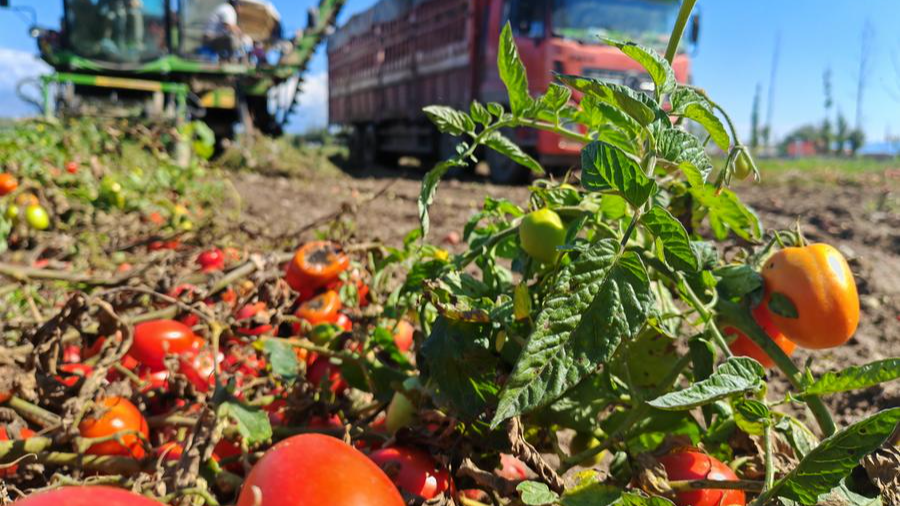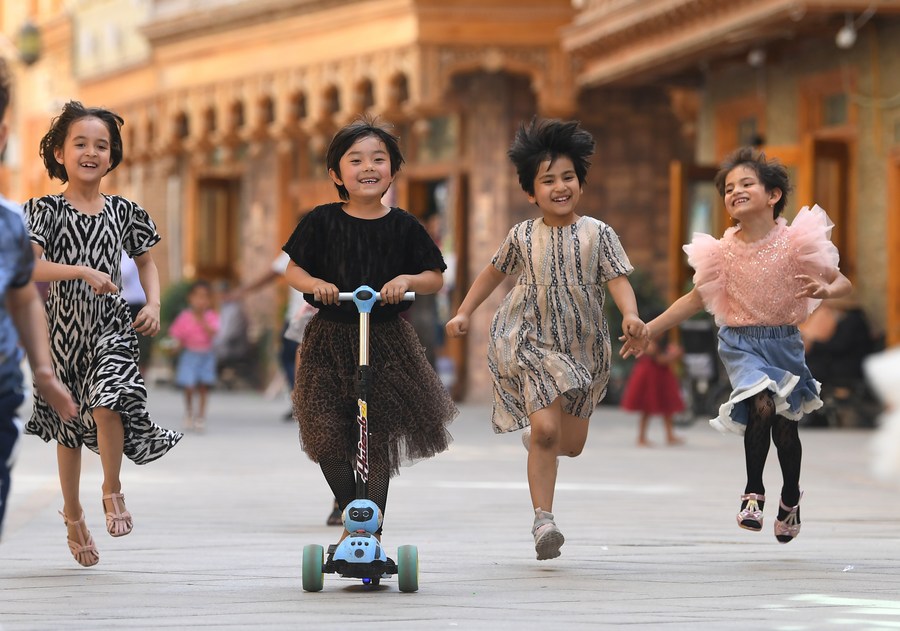
A picker is harvesting tomatoes in Bole, northwest China's Xinjiang Uygur Autonomous Region, September 12, 2024. /Xinhua
Editor's note: Bai Fan, a special commentator on current affairs for CGTN, is an associate researcher at the Institute of Chinese Borderland Studies, Chinese Academy of Social Sciences. The article reflects the author's views and not necessarily those of CGTN.
A recent BBC report accused "'Italian' tomato purees sold by several UK supermarkets" of containing "tomatoes grown and picked in China using forced labor." The loophole, according to the BBC, is caused by the "softer approaching" taken by Europe and the UK.
Presenting itself as a moral vigilante, the BBC is doing the opposite, depriving people in Xinjiang of their rights to life, employment and development. Such violation of human rights is "justified" by the name of "caring," revealing the hypocritical nature of the Western media.
Human rights are important because they uphold the dignity of human life. To achieve this dignity, individuals must be able to earn a living through their own labor. A country that respects human rights should ensure that people have the right to fair wages, enabling them and their families to live with dignity.
Doubtlessly, mechanization promotes large scale production but inevitably reduces manual job opportunities. To ensure employment, the Chinese government has developed industries in Xinjiang suited for its local conditions.
Thanks to new technologies, Xinjiang local tomato enterprises have adopted agricultural mechanization, boosting the production of the vegetable, while still having created jobs and encouraged local farmers to participate. With the desire to live a better life, farmers in Xinjiang, regardless of their ethnicity, choose their own way to make a living.
At present, the tomato industry is vital for Xinjiang's economy, demonstrating China's commitment to human rights development. It should be respected, rather than undermined by the international community.

Children have fun on Dove Lane in Hotan City, northwest China's Xinjiang Uygur Autonomous Region, May 27, 2020. /Xinhua
However, rather than uncover the truth about people's lives in Xinjiang, the internationally renowned media group is stigmatizing Xinjiang's products with unverifiable "witness" accounts and shaking "tests" results. If the tomato industry were to be destroyed as the BBC hopes, countless people in Xinjiang would lose their jobs, imperiling their basic rights to life, employment and development.
Proud of its "objectivity," Western media is an expert in "double standards," particularly good at fabricating stories about China's Xinjiang. Their goal is to wage ideological warfare against China while upholding Western protectionism and centrism.
Ignoring the regional development, some Western media exploit issues of ethnicity and religion, shaping international perceptions and global public opinion with a "neutral" stance. Their ultimate goal is to destabilize Xinjiang and tarnish China's global image.
By hyping up and fabricating "forced labor" in Xinjiang, the Western media is trying to suppress China's development, justifying Western protectionism and maintaining a Western economic monopoly.
The BBC, together with some other Western media, insists on Western-centrism in international political competition. They disregard journalistic ethics and fake narratives about "forced labor" in the Xinjiang tomatoes industry. This is obviously an attempt to put the West on the moral high ground of maintaining international "humanitarianism," sugarcoating their sense of superiority.
In international politics, Western centrism is always coated with the so-called objectivity, neutrality and free press. By contrast, the Western media are actually seeking to maintain their dominance in the discourse of international public opinion. When reporting non-Western countries, they adopt "double standards," implement neo-colonialism and neo-imperialism.
In recent years, some Western media have been constantly drumming up undue concern about the "forced labor" topic in Xinjiang. However, most of the international community rarely responds to these topics, because the "forced labor" in Xinjiang fabricated by the United States and the West is essentially an illusionary topic.
In conclusion, it could be seen that the BBC's intention in reporting on Xinjiang tomatoes is not to care about human rights in Xinjiang, but to undermine human rights development in Xinjiang. In essence, it reflects the political purpose of Western neo-imperialism to contain China's development.


